Three faces, three grimaces but Jacob Fuglsang is almost cracking a smile and he’s just about to ride Michael Woods and Davide Formolo off his wheel to go solo for the win and for once Julian Alaphilippe isn’t going to threaten him.
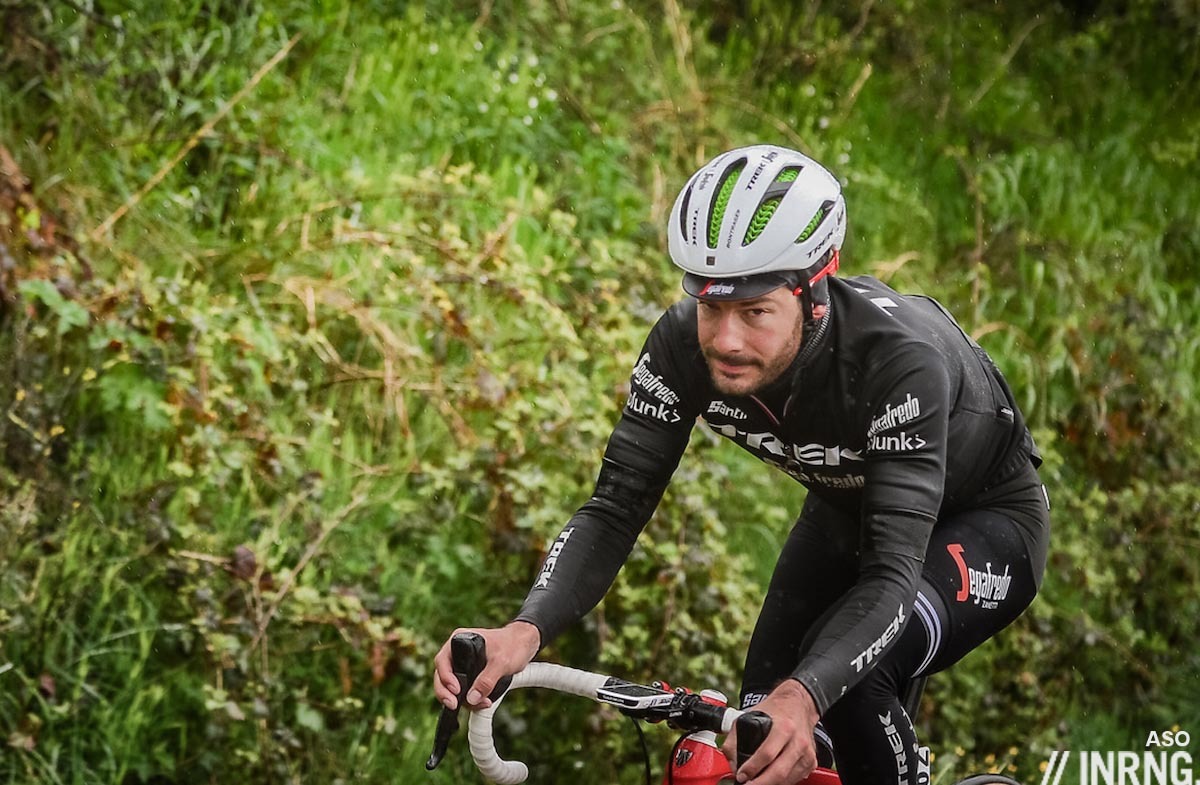
Enjoy a cold shower? It’s bracing for a few seconds but try it for hours on end and it’s called racing. The previous week’s Amstel Gold Race with its apple blossom and warm sunshine felt like a different season. It wasn’t snowing in Liège but riders still needed gloves and wardrobe choices mattered. Riders needed to stay as warm as possible while avoiding a boil-in-the-bag scenario where they’d overheat and sweat underneath rainproof layers. An early break went clear and it was as menacing as a waffle although it contained a big engine in Tobias Ludvigsson of Groupama-FDJ and breakaway regular Julien Bernard of Trek-Segafredo.
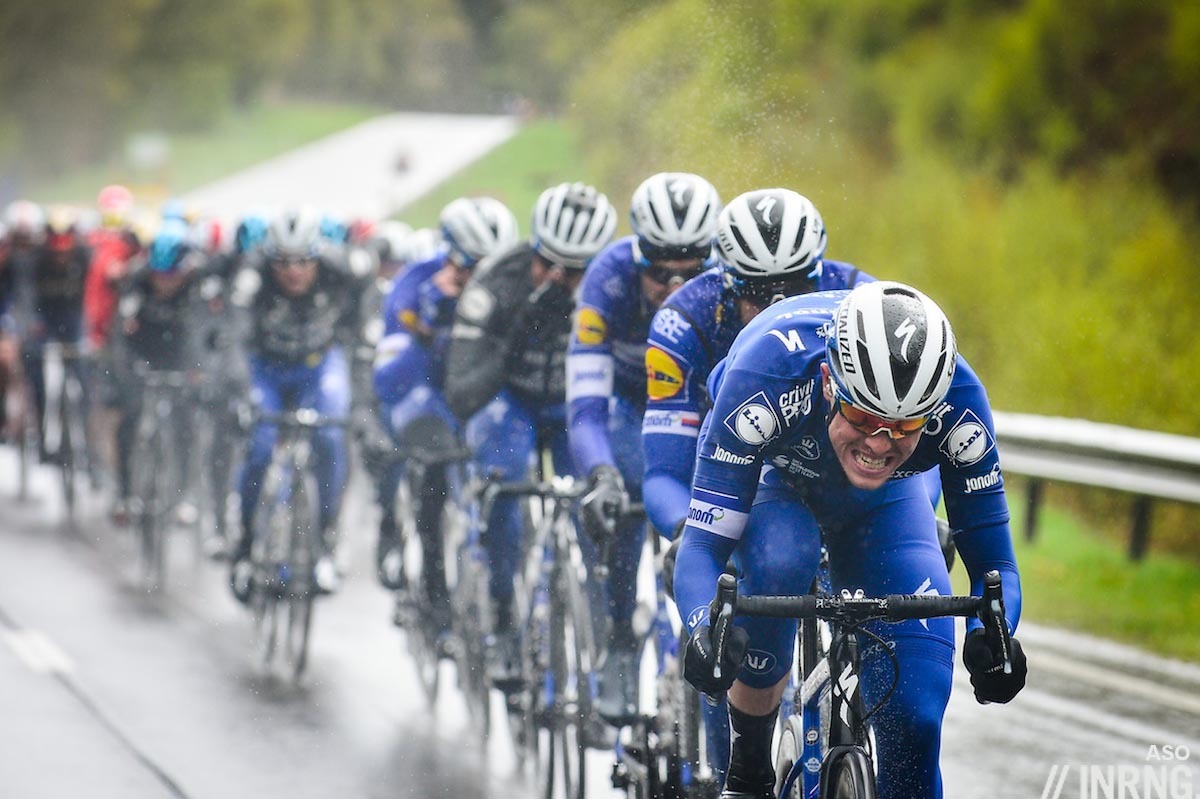
Quickstep took up the chase with 100km to go on the approach to the Wanne-Stockeu-Haute Levée climbs and the race defrosted with 75km to go, promising for Liège-Bastogne-Liège, after an attack from Philippe Gilbert helped split the field and a group went clear with Greg Van Avermaet a visible presence. The increased pace saw lone breakaway survivor Julian Bernard caught.
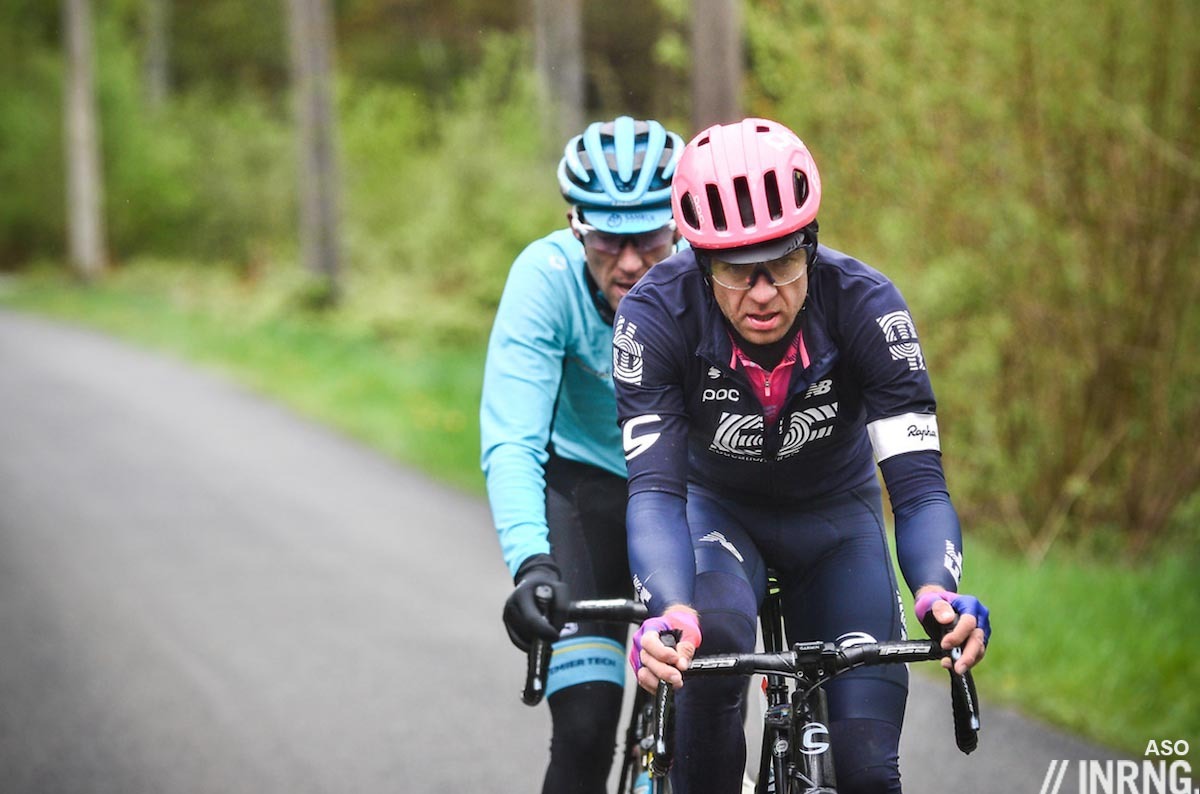
At the foot of the Col du Rosier Tanel Kangert attacked with Omar Fraile. Team mates at Astana last year, now Kangert was there in the pink and blue tie-dye EF Education jersey, a transfer over the winter that you’d forgive even EF team staff from missing. Over the top of the long mountain pass a larger group went in pursuit but for once this spring it had no Deceuninck-Quickstep riders and the team were forced to chase.
Kangert and Fraile were caught but on La Redoute Kangert went solo again. Behind the bunch seemed to huddle on La Redoute as if the riders wanted to read every “PHIL” daubed on the road but more likely many legs were blunted by the cold and the breakaway still up the road was keeping a lid on things: anyone still with the energy to surge clear would just make it across to the breakaway and find a group of suckerfish ready to sit on their wheel.
With 25km to go Tanel Kangert was finally caught by Patrick Konrad of Bora-Hansgrohe as the German team was starting to use its numerical advantage just as Deceuninck-Quickstep was running out of riders, Philippe Gilbert having been dropped like an anvil on the Côte des Forges. Tim Wellens and Daryl Impey jumped away to bridge across to Kangert and Konrad and if the quartet looked unlikely to win they seemed to be getting an option on the finish as they built up a buffer ahead of the final climb, the Côte de la Roche aux Faucons.
Then Astana rushed to the front with almost a full team – only Alexey Lutsenko was missing – with five riders pulling for their leader Jacob Fuglsang. It was an obvious and imposing tactic, more sledgehammer than scalpel but that’s Astana and it worked. Fuglsang went clear with Michael Woods and Davide Formolo for company as Julian Alaphilippe vanished, shades of Innsbruck last year when he faded on the final climb. The Côte de la Roche aux Faucons has its official summit and then famously it dips before rising up for 1.5km at 5.5%, no mountain but by now it’s a crowbar that levers apart any differences. Woods was sporting one leg warmer, as if caught out while trying to remove layers for the finish while Formolo’s still cherubic face was contorted as if he was going to burst into tears any moment and call for his mamma.
Having broken Woods and Formolo, Fuglsang was clear and with a margin and a descent into Liège and as he dropped down through woodland he was carving every corner to the point of a high speed wobble as his rear wheel slipped on a painted road marking and for a split second his win was in jeopardy but his speed and momentum corrected things and he was back in a straight line to take his big win. Formolo held on for second place while Max Schachmann finished his classics season by winning the sprint for third place out of a group of containing Mikel Landa, Adam Yates, David Gaudu and Vincenzo Nibali the others.
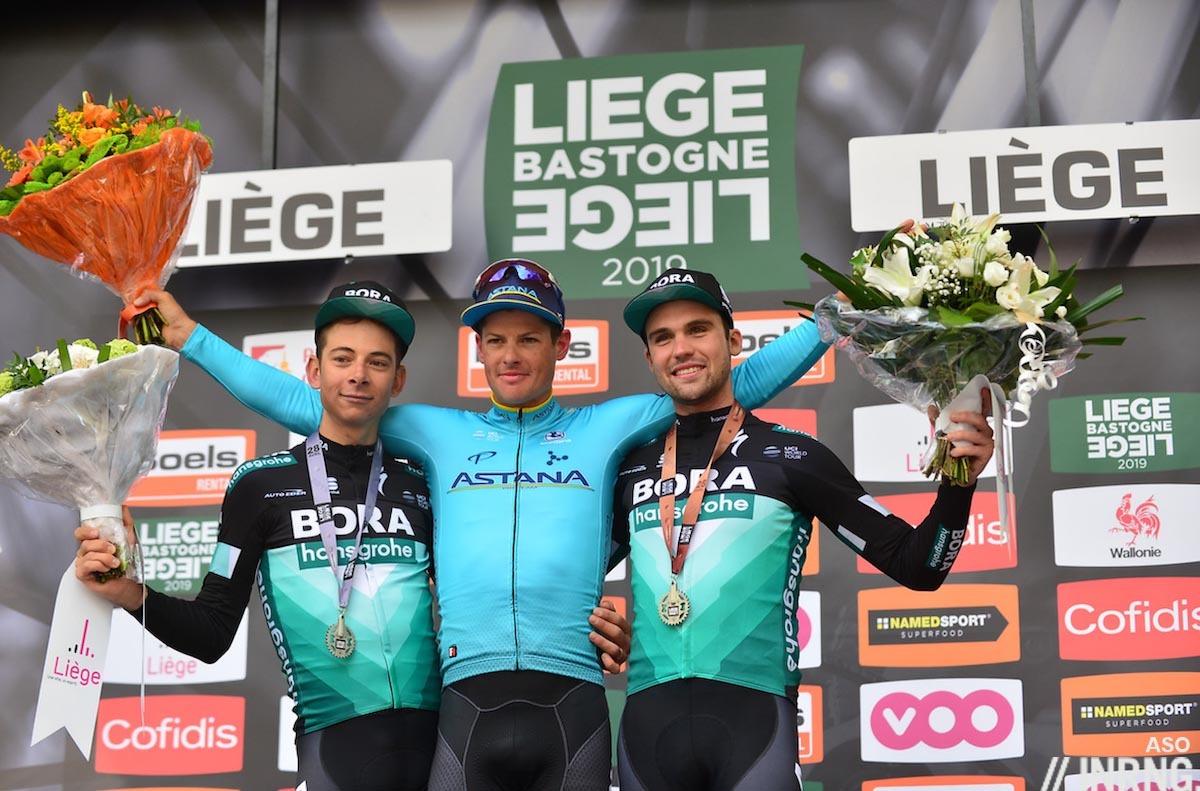
The Verdict
An emphatic win for Fuglsang who has enjoyed his best ever spring classics season thanks to a collection of near-misses. Here he went for the win and got it, blowing the field off his back wheel to win solo in Liège. It wasn’t a thriller though, there were no constantly changing scenarios, the breakaways were reeled by the strong teams and Fuglsang’s attack was signalled from so far out that if it had urgency it wasn’t a surprise. But those sitting on a sofa in a warm room couldn’t ask for much more.
It’s Fuglsang’s biggest victory by far, until now his best has been the Critérium du Dauphiné overall and stage wins in the Dauphiné and the Tour de Romandie, high quality but his is a palmarès more about the races lost than won, he’s often been on the podium but rarely the top step, and he’s often placed second, for example second in the Tour de Suisse last year, second on the Rio Olympics; or worse got the chocolate medal for fourth place so many times. He’s also been second as in second choice at Astana where he’s been deputy to the likes of Vincenzo Nibali and Fabio Aru. He’d been a danger for becoming a “forgotten rider” as the Dutch website Het is Koers celebrates regularly, those who enliven many a race but are forgotten because their name was hardly ever engraved on a trophy, nor became a line of code on Wikipedia. Fuglsang’s been a staple of races this decade but almost never a victor. What’s made Astana so good this season? One tweet that flew by yesterday suggested Fabio Aru’s departure meant the team became united in the absence of the Italian clique… but Aru left the year before last.
Is the new finish better? It’s too soon to tell given the cold conditions iced the racing but in favour Liège finish is the idea of Fuglsang attacking for the win on the Roche-aux-Faucons, a relatively long-range move. Maybe 2020 will tell us more. It marks the end of the classics season, yes there’s the Frankfurt GP this week but now attention turns to the Tour de Romandie and the Giro will be here very soon. For all Astana’s strength so far this season the question is whether they can keep this up over the coming months.

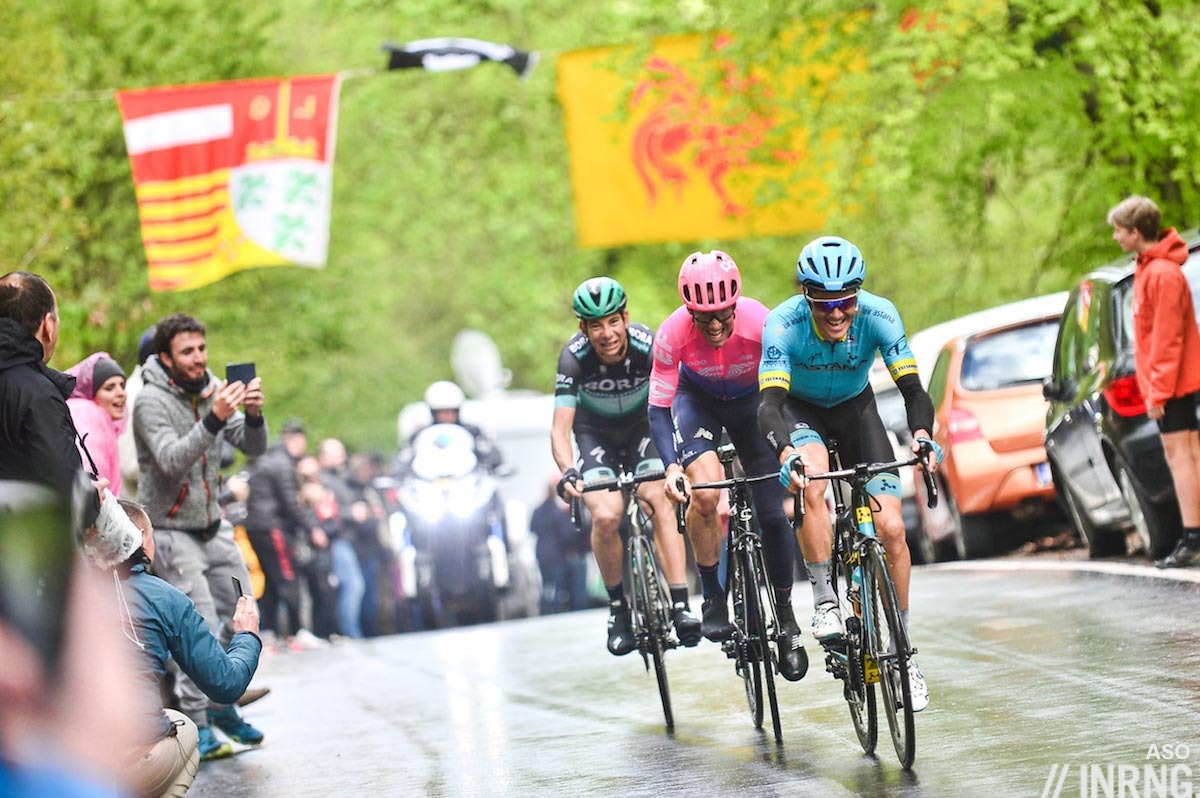
He’s been around so long you even forget to mention his very first team-captains: the Schlecks, since almost forgotten themselves. Didn’t Andy S. actually win LBL by attacking on the Roche and soloing to Ans himself?
Exactly. Andy soloed away on the Roche aux Faucons, caught PHIL before the final rise and dropped him.
Curiously, he also finished 2nd in Fleche prior to LBL that year.
I’m sure Google/Wikipedia could confirm this for me, but I’m sure there’s an unlikely sounding fact that LBL was the only race Andy Schleck actually ‘won’…
Not counting stage wins in tours?
Surely at the least he’ll have racked up a national title or two?
I felt this was worth checking – it’s not quite correct, but it’s not far off…He won a few Tour stages (which are a fairly big deal, of course), a few Nat champs (2x TT, 1x Road) and a few minor races (Fleche du Sud, Raboronde Heerlen, Tour of Luxembourg stage), but that’s about it…
That wobble by Fuglsang at 4.9 km to go – whoa!! Scary stuff if he’d have gone down but don’t what happened that allowed him to correct it and stay upright – pure luck or jedi like reactions but a deserved victory to cap off a great spring.
Seems to be an Astana staple this season, did you see the crazy, nay epic, finish of Lutsenko’s at Tirreno-Adriatico?
An epic save surely, but he is a former MTB U23 world champion and has bike control as second nature.
Remember the TdF-stage run over the Paris-Roubaix-territory? Nibali and Fuglsang came out on top of the GC contenders on that one.
Boom won that day because Fuglsang had to wait for Nibali. Nibali won the tour that day due to that performance.
Wett cobbles at Roubaix : Fuglsang would be able to win, said it for years – but he has never been allowed to ride. perhaps 2020.
Great write-up as ever. One small correction: “while Max Schachmann finished his classics season by winning the sprint for fourth place” should be third.
Fixed, thanks.
Michael Woods looked like he was late for a meeting at the Masonic lodge. Still, he couldn’t buy any favours. Story of his classics season.
Foul weather dampening things or not the racing in the last 75km was good. Chapeau to Fuglsang, I for one, am very glad he won. Nice to see a podium with no blue on it.
[INRNG: comment edited at the author’s request by email]
I’m not sure I know what “I still think J.V. has made a pact with the devil” apart from suspecting it’s probably libelous.
I’m pretty sure you’d have to prove the actual existence of the devil, before you can get him to testify in a court of law.
Um, yeah – apart from the blue of Astana and the blueish-green of Bora there’s no blue at all…
A little harsh on Astana there, Inner Ring?
I thought that they managed the race masterfully (apart from Ion Izagirre’s impromptu trip to the park – good to see he finished in one piece later), when chief rivals didn’t.
DQS were far too bold (over-confident?), whilst others too conservative (Bora perhaps, Bahrain Merida, maybe Team Sky – all finished with several riders in prominent placings).
I agree that their late move was telegraphed, but on such a foul day staying relatively hidden was smart.
Instead, DQS must be smarting after that, I appreciated their efforts but ultimately in vain. They seemed to lack their usual options (all-in for Alaphilippe was hardly keeping their hand close to their chests) and perhaps missed Bob Jungels?
Maybe a collective tapering of DQS spring form? Bora on the other hand, 4 of the top 15 ex Sagan… s strong finish
It was strong by Astana and it played to their strengths, not meant to be harsh on them as they used the cards they had meaning a team where half the squad could win on paper but they all rode for Fuglsang and set him up when other teams were down to a couple of riders.
I was quite surprised that Lutsenko was underwhelming in the Ardennes. He started the season very strongly, in similar fashion as Fuglsang, but couldn’t maintain the same shape after his break after Tirreno. Maybe it would have been better for Astana if he had focused on the cobbled classics instead. They were lacking a rider who could challenge there for them.
Possibly he had his peak earlier this season. Like you said he has been very visible already. Could also be mechanical, bad luck or the weather.
Great article, as always. Small correction, though:
” while Max Schachmann finished his classics season by winning the sprint for fourth place out of a group of containing Mikel Landa, Adam Yates, David Gaudu and Vincenzo Nibali among others.”
Sprint was for third place. Woods was caught before the end.
let’s make this the corrections thread 🙂
it is tie-dye (noun) as the verb is dyeing… #pedant..
The moment LBL was won: When Fuglsang placed second in Fleche Wallonne…
A return to ‘form’ for Quickstep after a Spring of consistency and efficiency. And while not ‘nice’ to see, it is heartening that even someone as gifted as Alaphillippe is not able to maintain form from San Remo to Liege. Roughly the same time period as Omloop to the Ronde, and maybe that same metric applies?
Alaphilippe took a break in between, as soon as Sanremo was done he had several days off the bike, fell ill when he wanted to resume training and so started even later…and didn’t return to racing until the Tour of the Basque Country where he crashed out. So his kilometres/hours spent cycling in April could actually be quite low. He won’t race again now until the Dauphiné as he builds up to the Tour de France.
“Alaphillippe is not able to maintain form from San Remo to Liege”
What a loser, huh? He had a formidable spring and won his last race just 3 days ago, but if he has one bad day in the cold, he is not able to maintain it.
Oh I’m glad armchair judges are able to maintain their lousy form from Omloop to Il Lombardia. What have you won from MSR to Liege?
Why so aggressive, Mr Anonymous (although you seem strangely familiar)? I thought it was a perfectly reasonable point
Likewise, think they’ve picked up the wrong end of the stick.
My comment was actually supposed to be more positive than negative. Alaphillippe is an incredible rider who has had an incredible spring. The same way it is supposed to be hard to win Omloop and Flanders, I was wondering if you could compare the MSR/LBL double. As Mr INRNG pointed out, it’s not an apples to apples comparison.
Only two riders have won MSR & LBL in the same season. Fred de Bruyne being the non-Merckx answer.
In interviews before the race, Fuglsang explicitly described his strategy for the win. So Astana’s plans were no less apparent than DQS’s. Everyone knew what was coming yet were unable to counter it. The (mild) surprise was Alaphillippe’s fade…
Yes plan was to burry JA and everyone in acid and cold weather.
This was race for the strongmen …lets hope he will be allowed to do Flanders & Roubaix next year.
I somehow missed those articles reporting about Fuglsang talking about his strategy before the race. But he still was my favorite. And despite all the talk of the new finale making this race less predictable which all too often suffered from a somewhat short burst of action in the past editions it has lived up to my expectation that it will become even more predictable. The Roche aux Faucons is Liege’s Poggio now. Not in terms of difficulty, mind you, but as the point where the decisive selection will be made. And being much more selective than the Poggio it will make sure that usually the strongest rider will win the race. Provided he has a team strong enough to deliver him to that point with as much left in the tank as possible.
Team Astana did just that. The script / strategy to win that race is easy provided you have someone as strong as Fuglsang, but they masterfully, yeah I’m tempted to say clinically despite that show of brute force in the approach of the Roche aux Faucons, made it happen. Fuglsang’s sliding rear wheel in that descent – which he incredibly saved – was the only foot they set visibly wrong the whole day. Impressive!
I think it’s fair to wonder why they’re so strong this season. I mean they surely were already very good last year but the difference is still very pronounced. For now, I’ll not speculate, enjoy the show and hope it will not end with a “it was too good to be true” moment.
Apparently (via various Twitter reports of a post race fuglsang interview) Alaphilippe told him mid-race “I hope you win today”. As if there weren’t enough reasons to love Alaphilippe already.
…’Gilbert having been dropped like an anvil on the Côte des Forges’.
Like it!
What’s happened to Kwiatkowski and GVA? They’ve been at the pointy end of a lot of Spring races, but not a win between them, and they’ve barely cracked a top 10. Not a contract year? CCC doesn’t have the depth BMC did, but Sky has been well represented late in races. Odd.
I’ve seen comments on sites that shouldn’t be mentioned that this was a boring edition.
Au contraire, I think this was a great race, and the spring season has been absolutely wonderful.
In Amstel, after watching a great womens race I was thinking, again as usual the mens race would be boring.
How wonderful to be wrong!
Even Fleche was a good watch this year.
And “empathic victory” has been overused so much, but was never more right than yesterday. Very happy for Fuglsang
And the guy I was speaking to on the phone at 4,somethingK to go thought I had a heart attack, and I pretty much had to be honest.
From the videos he didn’t slip on a road marking I think, though. He was well over the white, but the speed was very high so what do I know, just glad he kept on the bike.
Good stuff!
Haha, “long mountain pass”, in Belgium…
Fuglsang attacking over the Roche-aux-Faucons is not really that long range, it was still effectively a late attack over the final climb. So for me the change in parcours is positive but we still need to see how this plays out in the next couple of years. The risk is like the comment above that Faucons becomes Liège‘a Poggio I think we’re more likely to see the racing break open like the changes to Amstel gave us.
What is the thinking behind short-sleeved rain jackets, seems like a contradiction in terms as well as looking odd?
You can pair them with arm warmers coated with a water repellant. But the short sleeve rain jackets are more like wetsuits, they’re not always dry inside but keep you warmer.
Temperatures at start of race were in single digits. During signing on, the rain recommenced and built to a deluge by the time the race got underway. We’d been dropped off at the start by a couple of mates photographing for Peloton Photos and they messaged us from their first stop, to report 4c and raining in the hills. We spent rest of the day in Liege and it wasn’t until the afternoon that some weak sun created any warmth on the day.
Yikes! Glad I went last year, but of course it could have been like 1980. Having seen them all now I think the only one I’d go back and see live again would be Lombardia, otherwise TV is fine.
This year I was lucky enough to be in a ristorante down in Sicily (aptly named Giro d’Italia) where we talked ’em into putting the race on the big screen TV’s throughout the place. As long as we kept ordering food and wine for the 3 hours of TV broadcast they (and we) were very happy.
Who won again? 🙂
No gloves for Bernard… Had he some at the beginning of the day, and got rid of it for the finish because they were soaked ? If not, it’s worthy of a flandrien…
Actually, if you’re what we jokingly call a fisherman’s son, it can be quite tolerable if not quite comfy to ride without gloves in cold. It is also an easy and remarkably efficient way of cooling your core down when you feel you could be getting a bit toasty.
It’s only when the temperature drops several degrees below zero and your bar tops, hoods and especially levers transmit cold directly to your fingers that you can get into real trouble or at least really uncomfortable without a pair of proper gloves. (You can and should adjust your grip and learn to keep our fingers “alive” instead of holding a “dead” grip, but it only helps so far,)
PS I wouldn’t hesitate to say it was a magnificent performance. Maybe it was not a classic race and there was never a man-to-man contest or a game of tactical finesse played by riders in a final breakaway, but I don’t think that takes anything from Fuglsang’s victory.
My hands always freeze easily so I tend to ride with gloves until double digit temperatures. On your note about transmitting cold it is the other way around. And aluminium is quite good at conducting heat away from your hands on a cold day. I noticed that my hands took way longer to get cold when I switched to carbon bar and levers. Carbon is – relative to alu – a bad conductor of heat and thus your hands will take longer to cool down.
I believe most of the peleton feature carbon bars and levers.
No offense but if your hands freeze easily you’re “pas normal”, you are a borderline Raynaud’s at best:-) Normal procedure doesn’t apply to you and your mileage varies too wildly to be any guide to those with luckier hands. More seriously: individual variation is huge, but for a majority of people their hands and their circulation is “trainable” and they are “good responders”.
Of course it is heat moving towards cold, this is elemental physics, everyone know that – but only a would make a point of correcting when the obvious point is about how it feels to a human being holding cold aluminium, carbon or rubber in his hands.
And believe me, it doesn’t make one iota of difference whether it’s alu or carbon when it’s -10 C or colder!
You are quite right, sir, though I do not consider myself “pas normal” 😉 I do have a slice of Raynaud’s.
At -10 nothing else matters than keeping warm but I was more in the range of 0-10 C. And perhaps I am alone i noticing the difference between the materials, anyway, it was quite noticable.
On a side note; my daugther’s (13 y) hands stay extremely warm. Even during sub-zero temperatures and snow she works (snowballs, -men etc) without gloves or mittens. I don’t know how she does it but I am envious.
I recall watching Le Samyn last year, run in temperatures of around -3 degrees, with ice visible on parts of the road and certainly on the fields…Phillipe Gilbert was riding without gloves and finished second. Hardman.
Circulation (in response to cold) is “trainable”? What a load of complete horseshit. Source?
I hope nobody is taking you seriously.
I guess he means to the pain tolerance.
Although it’s true that Flemish kids are not wearing much when mine starts to ask (by himself, parents will get this) for extra layers.
I have started to casually forget his gloves when we go out for a ride in early spring.
Then I end up not wearing them myself, because what dad would be seen in that situation.
So, it doesn’t work for me, since I’m all grown up, pampered by my mom. I hope it’s going to work for him, 7 now, growing up a bit more exposed.
So I would say it’s not training, but the way you were brought up might be it.
I’m the last of my group to give up on early spring layers.